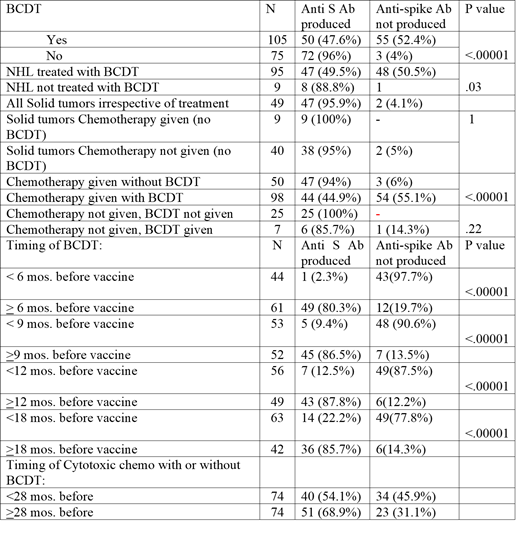Abstract
Introduction:
Patients with NHL have a longer duration of illness and higher mortality rate after infection with Covid-19 1-3. Vaccination is strongly recommended to mitigate these problems in the general population, however, patients with cancer were not eligible to enter the pivotal vaccine trials. Furthermore, patients with NHL as well as other hematologic malignancies are frequently treated with B cell depleting therapies (BCDT) such as Rituximab and other anti-CD20 antibodies which in theory affect antibody production after vaccination. There are no data in the literature regarding patients with NHL and scarce data on other tumors concerning the antibody response against the S protein of Sars-Cov-2. To investigate the production of antibodies against the spike protein following vaccination against Sars-Cov-2, we studied 180 patients with cancer. We also aimed to determine if factors such as timing of BCDT in relation to number of days elapsed between such treatment and vaccination, as well as other features such as peripheral blood absolute B cell count correlate with antibody production.
Materials and Methods:
Anti-spike protein antibody production was evaluated in 104 patients with NHL and 76 with other malignancies. Eligible participants were aged 21 years or older. Study inclusion criteria included diagnosis of lymphoma or other hematological malignancy as well as solid tumors.
The Dimension Exel 200 method for qualitative detection of total antibodies was used to determine antibody production. The antibody test was performed > 14 days after the second Moderna or Pfizer vaccine dose or after the Johnson & Johnson single dose.
We prospectively evaluated antibody production following administration of BCDT as well as cytotoxic chemotherapy in 104 patients with NHL, 27 hematologic malignancies and in 49 solid tumors. In addition, we explored the timing of such treatments in relation to the vaccination date as well as the type of vaccine administered.
Results:
Median age was 61 and 59% were females. Of 180 entered, 104 had NHL. Of these, 95 (91.3%) were treated with BCDT, including rituximab (89), obinutuzumab (5) or anti-CD19 CAR-T cell therapy (1). BCDT was usually given together with induction chemotherapy and followed by maintenance. Histologic types of NHL treated with these therapies were: aggressive NHLs (N=35), follicular low grade (N=33), marginal zone NHL (14) and others (N=13). There were 49 patients with solid tumors. We also included 10 patients with other hematologic tumors who received BCDT and were analyzed together with the 95 NHLs to determine if this treatment interfered with anti-spike antibody production.
Conclusions:
These results imply a deleterious effect of BCDT on the humoral immune response to the SARS-Cov-2 vaccine. The correlation between the administration of BCDT and poor production of anti-spike antibodies is very robust, particularly in those cases who were vaccinated 9 months or less after BCDT. However, administration of cytotoxic chemotherapy without BCDT was not associated with reduced production of antibodies. In fact, almost all patients (94%) who received cytotoxic chemotherapy without BCDT, produced antibodies against spike protein (table 2). However, when chemotherapy was combined with BCDT there was a significant reduction of antibody production. These results strongly suggest that the major problem with poor antibody production following vaccination against Sars-Cov-2 relates to the use of BCDT and not so much to cytotoxic chemotherapy. The same findings apply to the 104 cases of NHL where half of patients treated with BCDT did not produce antibodies while 88% who did not receive BCDT produced antibodies (table 2). Almost all patients with solid tumors in our study (95.9%) were able to produce antibodies, irrespective of whether they received chemotherapy or not.
These data raise the question whether vaccinated patients treated with BCDT who failed to make antibodies against the spike protein, could also benefit from a third dose.
No relevant conflicts of interest to declare.


This feature is available to Subscribers Only
Sign In or Create an Account Close Modal